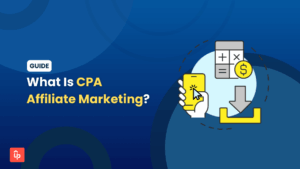Are you a merchant? We know businesses have difficulty with various online marketing strategies at their disposal.
Two of the most common are affiliate marketing vs digital marketing. But what are they, and how do they differ? And are they suitable for your business growth?
This article will reveal everything, including the similarities, differences, benefits, and which is better for you! Yes, we ensure you will gain more profound knowledge after reading, especially when you understand the long-term benefit of affiliate marketing in your overall business plan. So, please do not skip it!
We can’t wait anymore; let’s get started!
What Is Digital Marketing?
Digital marketing is a form of marketing that promotes services and products through various electronic media channels. It is a crucial aspect of modern marketing, enabling businesses to reach a more extensive customer base and accomplish their marketing goals more efficiently.
Back in history, “digital marketing” emerged in the 1990s alongside the Internet and Web 1.0 online platforms. The first clickable banner went live in 1994, and HotWired purchased a few banner ads.
Interestingly, those first banners had a 44% click-through rate, a number that online marketers can only dream about today! The digital marketing era officially began in 1998 when Google entered the space, followed by social networking platforms in the early 2000s, paving the way for the rise of social media affiliate marketing.
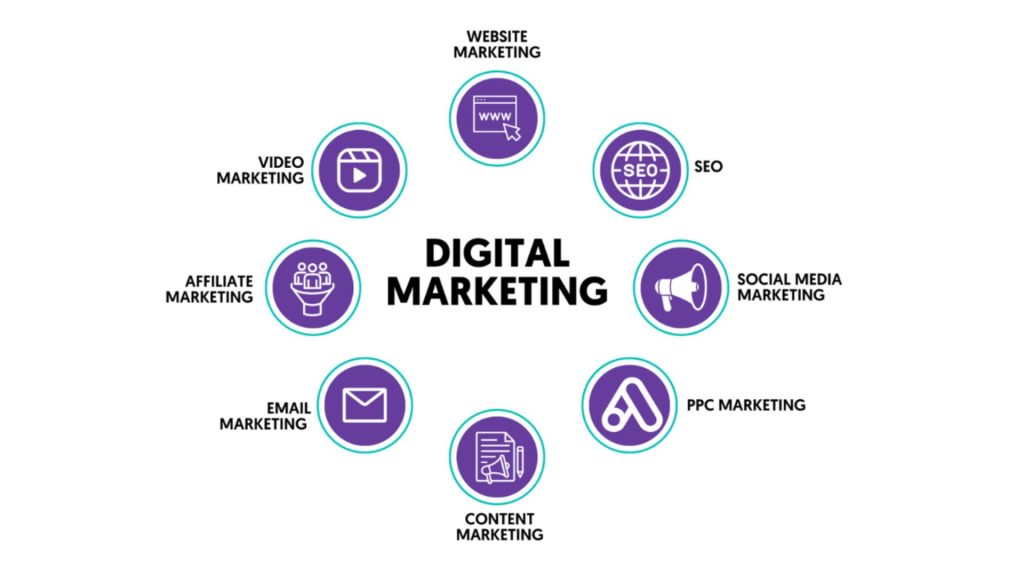
Nowadays, digital marketing is interwoven in virtually all Internet aspects and includes operations.
- SEO (Search Engine Optimization). It helps boost a website’s visibility in Search Engine Results Pages (SERPs).
The three main subcategories of SEO are on-page, off-page, and technical. On-page SEO optimizes content and structure. Off-page SEO builds links from other websites. And technical SEO optimizes the website’s technical aspects.
- Social Media Marketing (SMM). Some social media sites include Instagram, Facebook, Twitter, TikTok, and Pinterest. They help increase web traffic and bolster an organization’s online profile.
- Pay-per-click (PPC). Facebook and Google Ads are popular platforms to promote content online, where advertisers pay for each click their ads receive.
- Content Marketing. It involves creating & distributing various types of compelling content! Some include posters, articles, blog posts, videos, and social media posts.
- Email marketing. It is a highly customized approach to connecting with targeted customers. It provides exclusive content, special discounts, and personalized messages to subscribers.
What Is Affiliate Marketing?
Next, let’s talk about types of affiliate marketing!
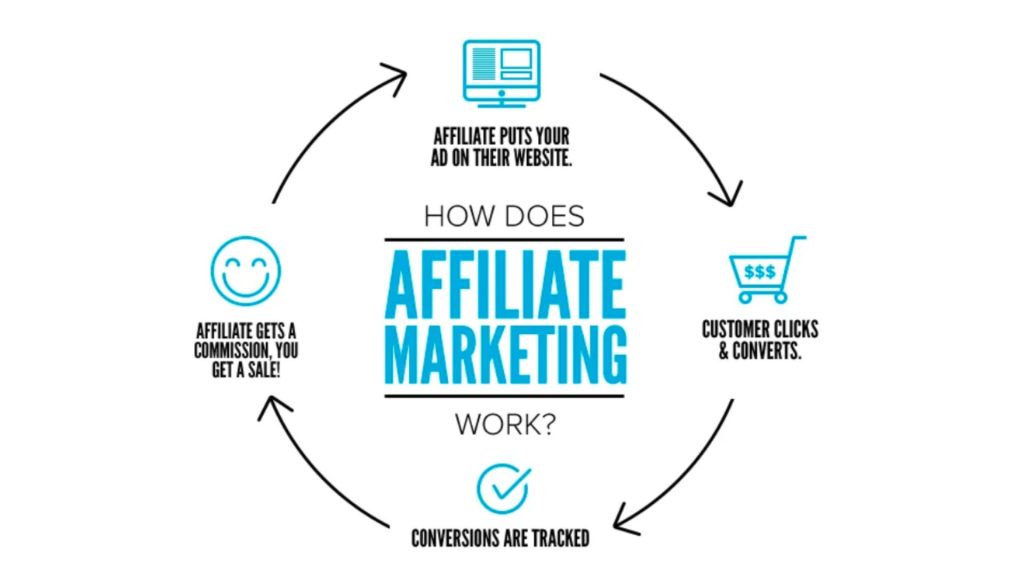
Affiliate marketing is a popular business model on the online platform. It involves three key components working together to make it a successful and profitable venture! They are the Customers, the Merchant, the Affiliate, and the Network.
- The customer. Yes! They are buyers who purchase merchants’ products/services through an affiliate’s link!
- The merchant. The people behind a product or service ensure it’s good quality and that customers are happy. They also pay a commission to others who help promote it.
- The affiliate, is also known as the publisher. They promote the merchant’s product or service. They will use a digital marketing strategy and platform to refer potential customers to the vendor’s product. When a customer purchases through the affiliate’s referral link, the affiliate earns a commission.
- The network acts as an intermediary between the business & the affiliate. It provides an online platform where affiliates can find and connect with vendors.
The network tracks the sales referred by the affiliate and ensures that the affiliate is credited for the sale. It also handles the payment process, ensuring that affiliates receive their commissions on time.
These components work harmoniously to make affiliate marketing a profitable and sustainable online business model.
Potential Revenue with Affiliates (UpPromote)
Estimate the potential revenue when you recruit affiliates: comparing Current Business and Business + UpPromote.
Estimated Impact
Quickly visualize how affiliates can boost your orders and revenue.
Revenue Comparison: Current vs. with UpPromote
The chart illustrates relative revenue growth comparing two scenarios: organic sales vs. organic + affiliate-driven sales.
- Affiliate traffic quality is equal to your current traffic.
- AOV and Conversion Rate remain stable.
- Does not account for churn, refunds, or potential upsell/cross-sell.
Affiliate Marketing vs Digital Marketing: What are the similarities?
Have you ever understood these 2 approaches and need clarification in front of them? We know the reasons! It is because they have similarities! Let’s explore these commonalities to gain a deeper understanding!
Offline unavailable, Just Online Presence
Both digital and affiliate marketing capitalize on the expansive reach and connectivity of the internet. They are unavailable offline!
Both methodologies strive to establish a solid online presence to connect with a significant customer base effectively. Of course, this is done by leveraging various digital online channels!
Focus On Conversion
Both methods are central to the overarching goal of driving conversions. Why? We do everything to earn money, even digital marketing or affiliate marketing!
Digital marketing’s multifaceted objectives to contribute to long-term business growth and brand equity! And affiliate marketing’s commission-based structure provides opportunities for rapid earnings through effective promotion and conversion optimization.
Whether it involves generating sales, securing sign-ups, eliciting clicks, or other predefined actions, both endeavors aim to motivate audience engagement! And it will ultimately translates into revenue generation.
Specific Audience Targeting
A core tenet shared by both online strategies is the emphasis on identifying and engaging specific target demographics. In digital marketing, this entails crafting tailored content and campaigns! They resonate with the characteristics and preferences of ideal customers.
Similarly, affiliates meticulously select products or services that align with the interests and needs of their audience. They must ensure a seamless match between offerings and consumer preferences.
Tracking By Same Performance Metrics
Both digital and affiliate marketing rely on data-driven insights to gauge effectiveness and optimize performance.
Employing sophisticated analytics tools, marketers track key performance! They can be indicators (KPIs) such as clicks, conversions, sales, and return on investment (ROI) to iteratively refine strategies and maximize outcomes.
Content Creation
Content is king! It is the linchpin of digital and affiliate marketing endeavors.
Digital marketers prioritize creating valuable, high-quality content tailored to resonate with target audiences! The goal is to foster engagement and brand affinity. Meanwhile, affiliates often produce content such as product reviews, guides, and comparative analyses to promote offerings and facilitate informed purchasing decisions effectively.
Relationship Building
Establishing and nurturing relationships is paramount in digital and affiliate marketing. It increases retention and prioritizes customer satisfaction!
Digital marketers endeavor to cultivate trust and customer loyalty, fostering enduring connections that underpin sustained engagement and advocacy.
Similarly, affiliates focus on cultivating a rapport with their audience, ensuring their recommendations carry weight and influence.
Collaboration
Collaboration is a linchpin in executing digital and affiliate marketing strategies.
Digital marketers collaborate with various internal and external stakeholders to conceptualize, execute, and optimize marketing initiatives! This collaboration will leverage diverse expertise to enhance reach and effectiveness.
Affiliates, on the other hand, collaborate with businesses to promote products or services. This results in forging symbiotic relationships that amplify brand visibility and drive conversions.
Data Utilization
Harnessing the power of data is instrumental in both digital and affiliate marketing.
Digital marketers leverage consumer insights and behavioral data to refine targeting, personalize messaging, and optimize campaign performance.
Similarly, affiliates closely monitor the performance metrics of their promoted products, leveraging actionable data to fine-tune marketing tactics and maximize returns.
Affiliate Marketing vs Digital Marketing: What are the differences?
What is the key difference between affiliate marketing and digital marketing?
The reach
How can we judge the reach of these two approaches? We must analyze the “Impressions” and “Frequency” to see the overview!
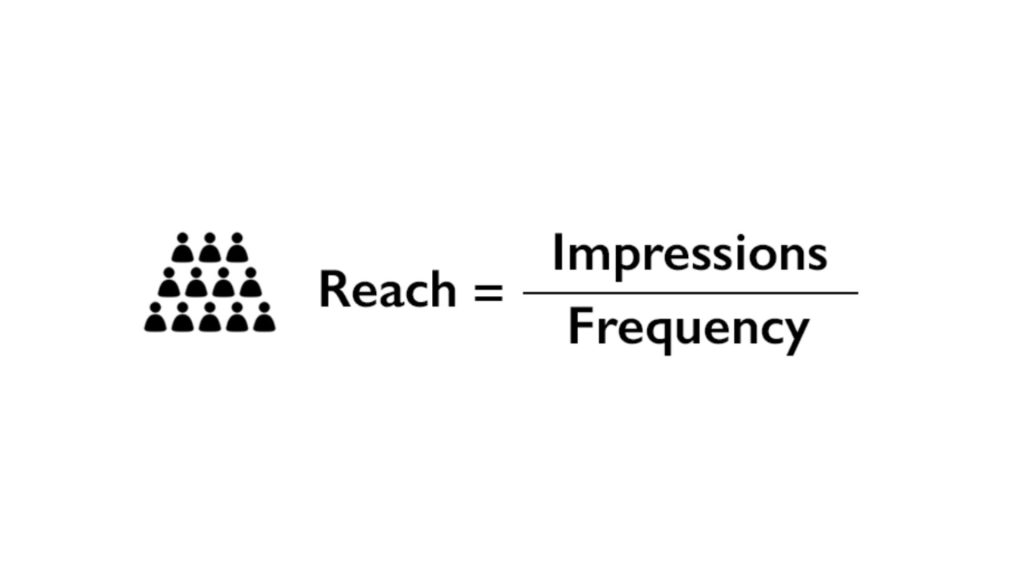
For Affiliate Marketing
The term “impressions” in this context refers to the number of times an affiliate link or banner is viewed by a user on the affiliate’s website. However, more is needed to know how often the link or banner has been seen. You also need to understand how frequently unique users view it.
It is where “frequency” comes into play. It refers to the average number of times a unique user views your affiliate link or banner. By dividing the total number of impressions by the frequency, you can calculate the reach of your affiliate marketing efforts.
→ The affiliates can be bloggers, influencers, or other businesses. The reach of affiliate marketing is limited to the size and engagement of the affiliate’s audience.
For Digital Marketing
“Impressions” are a key metric used to track the success of a digital ad. An impression is generated when an ad is displayed on a user’s screen. However, it’s not just about the number of impressions but also the frequency at which a unique user sees the ad.
This frequency is calculated by dividing the total number of impressions by the average number of times a unique user saw the ad. This metric, known as reach, gives marketers an idea of how many unique users were exposed to the ad.
→ The digital marketing has a global reach, as it can target anyone with internet access. There are various strategies in digital marketing, such as search engine marketing, pay-per-click (PPC) advertising, social media marketing, and content marketing.
Key Participants and Interaction Patterns
In digital marketing, three key players are the product or service being marketed, the digital channel (like an app or website), and the consumer.
To succeed, it’s essential to connect these three components seamlessly so that the brand’s message can effectively be delivered to the intended audience. The product or service is the main focus, while the digital channel acts as the medium to deliver the message.
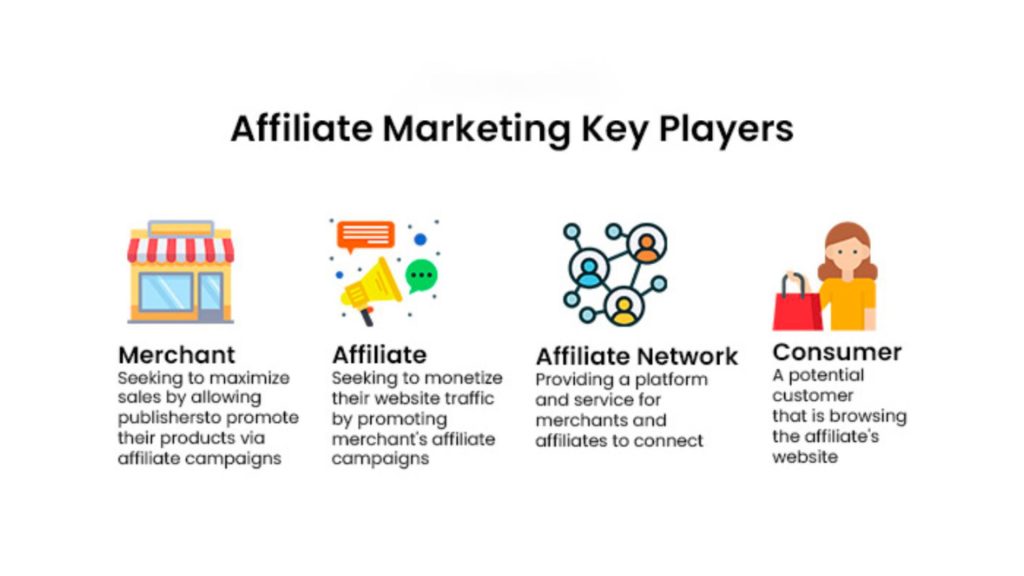
Affiliate marketing involves four participants! The merchant (product owner), the affiliate network, the affiliate (promoter), and the customer. The affiliate earns commission for each successful sale/ lead generated by promoting the merchant’s products.
Instead of focusing on one-on-one relationships between a product and consumer, it aims to reach a larger audience! How? By using a network of affiliates promoting products online. The key goal is to generate leads and drive conversions by casting a wide net.
Product Advertising and Profit Distribution
Affiliate Marketing: Affiliates advertise the merchant’s products and earn a commission for each sale or lead. The profit is shared between the merchant and the affiliate.
Digital Marketing: The business advertises its own products or services. All profits go to the business.
Ownership of Products/Services
With digital marketing, you have complete control over the entire process! The process include content creation, advertising, and tracking your results. Digital marketers can work full-time, freelance, or contractually and may have to sign an agreement with their company.
Conversely, for product owners, affiliate marketing involves promoting other companies’ products or services without controlling the branding or marketing process. Affiliate marketers are free to promote products for multiple companies, and earn commissions.
Scope of Responsibilities
Digital marketing involves many different tasks! Some include
- Studying the market and picking the right customers.
- Figuring out how to advertise products and services.
- Using intelligent sales tactics.
- Analyzing performance.
- Making changes to improve results.
On the other hand, affiliate marketing is simpler. It’s mostly about promoting products or services on different websites and social media platforms. People who do this earn money based on how many people they convince to buy the product or service.
Goals: Raising Awareness vs. Driving Conversions
Digital marketing aims to increase brand awareness, build a business’s online presence, and drive traffic to its website. It wants to create a lasting connection with the audience beyond immediately making sales.
On the other hand, affiliate marketing is all about making money quickly. Its primary focus is to sell products directly through persuasive marketing, using affiliates to achieve fast sales. While digital marketing aims for a long-term relationship, affiliate marketing thrives on quick, transaction-driven sales.
Necessary Skills
To succeed in digital marketing, you need to have various digital marketing techniques. These include search engine optimization (SEO), creating engaging content, analyzing data, and using video marketing.
SEO helps people find a merchant’s website on search engines, while good content keeps them interested. Improving AI search visibility also helps your content appear in AI-powered search results. Analyzing data allows you to improve your strategies, and video marketing is a great way to connect with people who like visual content.
Affiliate marketing is similar to digital marketing but requires more persuasive writing. Affiliates need to write content that makes people want to take action, like buying a product. It helps increase sales and conversions.
Rate of Profit Growth
Affiliate marketing is a type of marketing that allows for swift earnings accumulation. When promoting products effectively, affiliates can quickly earn profits through commission-based compensation. This commission-based structure incentivizes affiliates to amplify their promotional efforts strategically, resulting in swift financial returns.
In contrast, digital marketing’s revenue generation process often takes time to unfold. It relies on sustained brand-building efforts, such as nurturing customer relationships, creating a solid online presence, and building trust. Although the impact of digital marketing can be far-reaching, the time & effort invested in these activities can delay the realization of substantial revenue.
Benefits of Digital Marketing and Affiliate Marketing
For affiliate marketing
Let’s see the spoken number! Affiliate marketing has existed since the late 1990s and has seen steady growth in the US! With an average spend of 8.2 billion USD in 2022, up from 5.4 billion USD in 2017, you can see the improvement of affiliate marketing (Statista).
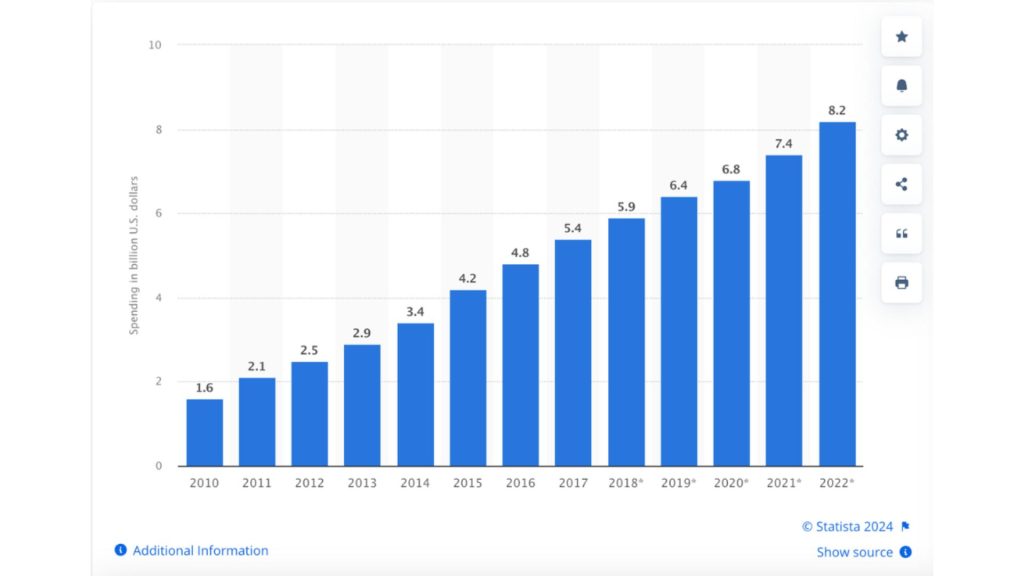
This global market size is predicted to reach USD 15.7 billion by 2024, with an annual growth rate of 10% since 2015. An impressive 83% of advertisers use affiliate marketing to increase brand awareness.
You can gain these benefits:
- Performance-Based Model. Merchants only pay for successful conversions.
- Reach New Customers. Merchants can quickly reach new customers without spending on expensive ad campaigns.
- Targeted Content. Affiliate marketing provides targeted content that builds trust among customers! You know that these customers may not be familiar with the brand or its products.
- Increased Leads and Conversions. It helps merchants get more leads and conversions.
- Cost-Effective. Merchants can tap into their affiliate’s built-in network to find the right customer without much trouble.
- Access to Tools. Affiliate networks offer merchants various benefits. Some helpful tools will benefit tracking and reporting tools, payment processing, and access to many publishers looking for work.
For digital marketing
Staying up-to-date with digital marketing trends is vital for professionals in the field. Between 2016 and 2021, social media’s growth rate was around 17% per year! It’s predicted to reach a global market size of US $255.8 bn by 2028. Video marketing is also on the rise! It is expected to account for 82% of all consumer traffic on the internet by 2026.
So, what are some highlight benefits you can gain?
- Global Reach. Digital marketing allows merchants to reach the international marketplace without the significant costs of traditional advertising methods.
- Targeted Marketing. Digital marketing allows for highly targeted marketing, reaching specific demographics and interest groups.
- Real-Time Results. Merchants can see real-time results of their marketing efforts, allowing for quick adjustments and improvements.
- Brand Development. Digital platforms provide an excellent stage for businesses to build their brand and reputation.
- Higher Engagement. Digital marketing encourages customer interaction and engagement, leading to improved customer retention.
- Data Collection. Digital marketing provides merchants with valuable data about their customers’ behaviors and preferences.
- 24/7 Marketing. The internet never sleeps, and with digital marketing, your campaigns run 24/7.
- Mobile Access. Digital marketing helps businesses reach customers on their mobile devices, as more people use smartphones.
Affiliate Marketing vs Digital Marketing – Which One is Better for Your Business?
Digital marketing vs affiliate marketing are two strategies for businesses! They can be used to reach the target customers & grow the campaign. But which one is best for your business?
For digital marketing
We all know that digital marketing involves promoting a product & service using various digital channels! These are social media, search engines, email marketing, and display advertising.
This strategy is ideal for businesses with a large target audience and the technical expertise to manage effective digital marketing campaigns. Digital marketing requires significant time, money, and resources but can yield good results if done correctly.
For affiliate marketing
On the other hand, affiliate marketing is a beginner-friendly strategy that involves partnering with other websites or influencers to promote a product & service. The affiliate receives a commission on every sale they generate through their unique affiliate link.
This strategy is ideal for businesses that want to expand their reach without investing much time or money in marketing. Affiliate marketing is an excellent manner to leverage someone else’s audience and expertise to grow your business.
In a nutshell, the best strategy for the business will depend on the merchant’s specific goals and budget.
- Digital marketing is a more complex and expensive strategy, but it can yield excellent results if done correctly.
- Affiliate marketing is more straightforward and cost-effective, but digital marketing may be less effective than affiliate marketing in reaching a large target audience.
FAQs
Can I use digital marketing and affiliate marketing at once?
Yes, you can. Combining affiliate marketing and digital marketing can be a great strategy for promoting your business. In fact, many companies are already doing it. But how can you make the most of this combination?
Firstly, you can use digital marketing to promote your affiliate programs. You can create a landing page explaining your program’s benefits and how it works! Then, you can use digital marketing tactics to drive traffic to that page.
Secondly, you can use digital marketing to promote the products & services that you are promoting as an affiliate. It can help you to increase your affiliate commissions. You can then share this content on your digital channels to attract potential customers.
How much money can I earn as an affiliate?
Did you know that affiliate marketing can be a lucrative source of passive income? According to recent statistics, the average affiliate marketer earns $8,038 monthly! But that’s not all.
Many legitimate affiliates are making a six-figure monthly income by promoting affiliate products. These savvy marketers are raking in the dough, testing their marketing skills, and coming out on top.
With so much potential for success, it’s no wonder that affiliate marketing has become such a common way to earn money online.
How can I earn money with digital marketing?
Digital marketing offers various ways to earn money.
You can start a personal blog or a website, generate traffic through SEO, and monetize it with ad placements or affiliate marketing. You can also offer businesses digital marketing services like social media management, SEO optimization, or content creation.
Additionally, you can create & sell online courses or eBooks about digital marketing. Remember, success in digital marketing requires up-to-date knowledge, creativity, and persistence.
Do I need digital marketing for affiliate marketing?
Yes, you do. To become an affiliate marketer, you must develop various digital marketing skills. Affiliate marketing requires a strong focus on persuasion and direct response copywriting.
These skills are essential for creating high-converting landing pages, and email campaigns! And even other promotional marketing materials. They can also help drive sales & revenue for the products or services you promote.
You can become a successful affiliate marketer by mastering the art of persuasion and crafting compelling copy! As a result, you can earn income through referral commissions.
Conclusion
That’s all about affiliate marketing vs. digital marketing! We would say each type of marketing has pros and cons! We also clearly analyzed the similarities and differences between 2 of these approaches to give you a picture overview!
Yes, now you can distinguish them, and it’s easier to know when to use the affiliate or digital marketing models to maximize the result!
Thank you for reading.


